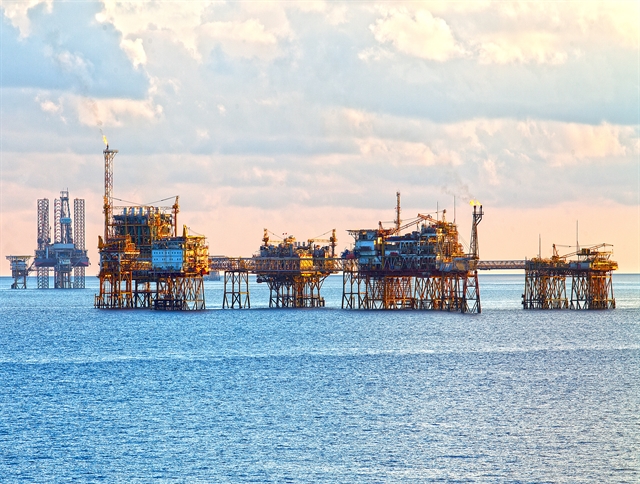Escalating geopolitical tensions between Russia and Ukraine would have a short-term impact on the Vietnamese stock market, but the market still has positive growth prospects in the long term thanks to stable macro factors.

Escalating geopolitical tensions between Russia and Ukraine would have a short-term impact on the Vietnamese stock market, but the market still has positive growth prospects in the long term thanks to stable macro factors.
VN-Index closed last week, the 9th week of 2022, with three gaining sessions, two decreasing sessions, losing 5.95 points, or 0.4 per cent, closing at 1,498.89 points.
Particularly on February 24, when the tension between Russia and Ukraine reached its peak, along with many other global stock indices, the VN-Index lost more than 17 points, with many stocks plummeting.
Bui Hoang Minh, senior analyst for individual clients at Ho Chi Minh City Securities Corporation (HSC), said that geopolitical tensions often had a short-term impact on the stock market.
Regarding the impacts, the Russia-Ukraine tension caused energy prices to rise, leading to rising costs, resulting in inflation in countries around the world. However, rising energy prices is a predictable problem, Minh said.
According to Minh, if oil prices continued to stay at US$80-90 per barrel, energy and fertiliser stock groups will benefit and put pressure on the monetary tightening policy decision.
“Geopolitical tensions will be a major issue in the first and second quarters, but when making investment decisions, investors need to look at a market with long-term economic prospects in the next 2-3 years, with benefiting industries such as real estate, industrial zones, oil exports and retail,” Minh said.
According to Nguyen Hoai Thu, Managing Director of VinaCapital's Securities and Bond Investment Division, the most obvious risk caused by the recent Ukraine issue is inflationary.
“On the supply side, sanctions and supply chain disruptions can lead to shortages of many basic commodities, which directly increases input prices for businesses. On the demand side, inflation can slow down consumption and investment disbursement in the economy, including public investment, due to high prices and unpredictable fluctuations,” Thu said.
“Directly affected companies may include businesses that depend on the prices of basic goods as input materials, but are unable to increase selling prices to offset the increased costs of raw materials and transportation,” she said.
“Airlines could take a double hit as the cost of oil rises and routes are disrupted,” she said.
“The investment portfolio of open-ended funds managed by VinaCapital struggle to avoid short-term negative effects, mainly because the stock market is often volatile and sensitive to news. However, the above risks do not have much impact on the prospects of the businesses in which VinaCapital is investing. Plus, we do not have stocks of airlines in the list," a representative of VinaCapital said.
VinaCapital currently focuses most of its portfolio on businesses that are able to protect profit margins against the risk of rising raw material prices and transportation costs. At the same time, it focuses on companies that have a sustainable competitive advantage and benefit from Viet Nam's long-term growth story, mainly in key industries such as banking, industrial parks, domestic services and infrastructure including transportation, maritime, and energy.
VinaCapital's fund managers will continue to monitor developments and may make necessary adjustments if tensions continue to escalate severely.
“We recommend that investors calm down and think carefully about their plans to withdraw money from the market. When the market falls deeply, it will be an opportunity for VinaCapital to buy good stocks at a cheaper price for funds, because we still believe in the positive prospect of Viet Nam's economy in the long term," said the VinaCapital representative.
“In the next week, we expect that cash flow will return to the group of large-cap stocks which had quite deep declines last week. With such developments, short-term investors can disburse a small proportion into the pillar stocks leading the market. Meanwhile, mid- and long-term investors should still wait for the time when the market price level is more stable before considering disbursing,” said Vietcombank Securities Company Limited (VCBS).
“The Russia-Ukraine tension does not have direct effects on the Vietnamese stock market, because of the disconnectivity between Vietnamese economy and those two countries. Only psychology of investors is affected,” said Do Bao Ngoc, Deputy General Director of Viet Nam Construction Securities Company.
Indirect effects are mainly the rising world oil prices, which will make the price of oil imported into Viet Nam increase accordingly. Business lines that use these items as input materials will incur higher costs, affecting business performance in industries such as freight, passenger transport and logistics, Ngoc said.
According to Nguyen The Minh, analyst director of Yuanta Viet Nam, the oil and gas industry group will directly benefit from the Russia-Ukraine tension. An increase in oil prices will promote the restoration of oil production, thus, businesses operating in the oil and gas sector will benefit.
In the opposite direction, petrol prices and logistics costs will increase, pressuring textile and garment enterprises and their profit growth. — VNS





